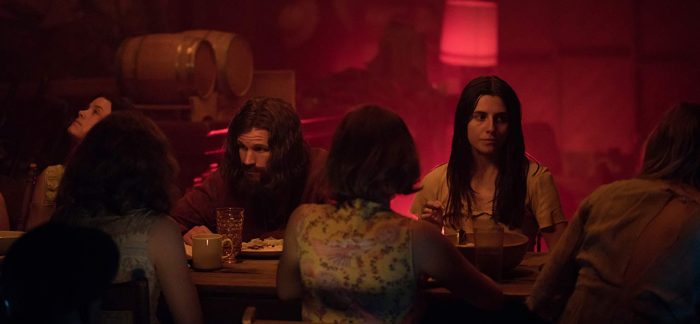‘Charlie Says’ Review: The “Manson Girls” Get A Dim Spotlight [Tribeca]

In the 50 years since the Manson Family committed the brutal murders that shook the nation, the cult and its infamous leader Charles Manson has never really left the public consciousness. And this year, the number of movies attempting to decrypt the notorious Manson and his all-consuming influence has ramped up, with everything from shockingly offensive horror films to star-studded Quentin Tarantino dramas taking on the cult leader. But what about the women who were under Manson’s thrall?
Charlie Says attempts to answer that question, examining the horrific Manson Family murders through the perspective of three of Manson’s most devout followers: Leslie Van Houten (Hannah Murray), Susan Atkins (Marianne Rendón), and Patricia Krenwinkel (Sosie Bacon). But despite the three women bringing this story to life from behind the camera — American Psycho‘s Mary Harron helms while frequent Harron collaborator Guinevere Turner wrote the script, and Dana Guerin produced — the film’s purported female gaze feels partially obscured.
Based on the book by Karlene Faith, who as a graduate student worked on therapy sessions with the “Manson girls,” Charlie Says toggles back and forth between these sessions while the girls are on death row, and flashbacks to their time with Charlie leading up to the murders of Gary Hinman on July 27, 1969, actress Sharon Tate and her four friends on August 9, 1969, and of Leno and Rosemary LaBianca just one night later.
Charlie Says opens with Leslie frantically scrubbing off blood in the shower before she, Patricia, Susan, and Tex Watson (Chase Crawford, woefully underused) hitch a ride with an unassuming driver. It’s the first of several promising scenes that establish the unspoken dread that permeates the film, which Harron cleverly amps up in scenes that don’t involve Matt Smith‘s Charles Manson. It’s the looming, omniscient presence of Manson that makes his presence so frighteningly powerful, especially when the girls mindlessly spew his philosophy to Karlene during their sessions. “Charlie says” becomes a sinister mantra, the real bars that are imprisoning the girls rather than the physical ones keeping them separated from the rest of the world.
It’s when Smith shows up on scene, electric, loud, and unnervingly charismatic, that he nearly steals the spotlight from the girls. He’s first seen onscreen playing guitar, shirt hanging loose when Leslie arrives on the compound, a naïve hippie looking for some absolution in this new commune. Smith seduces her, he charms her, and she is instantly enamored. But even in Smith’s magnetic performance, Charlie Says can’t quite nail the reason that Charles Manson’s followers so avidly worship him. The menacing edge to Smith’s performance relies heavily on the foreknowledge of Manson’s awful deeds — for the majority of the film, the “revelatory” philosophies he preaches sound like your run-of-the-mill counterculture beliefs. When Manson talks about how society is killing us, or the man is out to get you, it can’t help but feel like Charlie Says picked out the most generic stereotypes of hippie culture out of a hat.
There are glimpses of Manson’s poisonous influence at work, in the quieter scenes where a mundane incident transforms into a display of sexual power dynamics. One such horrifying scene takes place as the Family sits down to dinner, and Manson complains about Susan’s salad dressing. Instead of the usual sycophantic apology, she responds with a rude barb, in response to which Manson suddenly explodes: hitting her and wrestling her to the ground in a show of Manson’s physical and sexual dominance. Susan relents and later equates Manson’s hitting her with love — a dismaying result of Manson’s conditioning of his followers to accept sexual desire as love. But scenes such as this are few and far between, as Charlie Says often falls back on explaining Manson’s influence rather than showing it. The film doesn’t quite capture the intoxicating allure that a film like Martha Marcy May Marlene — to this date, the best Manson Family movie not explicitly about the Manson Family — has accomplished.
Harron lends a paternal air to the film’s approach to the three Manson girls, wanting to give them a voice but letting that voice come out in a barely-heard whisper. The problem lies in the de facto protagonist Leslie, played by Murray, whose wide-eyed guilelessness starts to feel more like a plot device than a character trait. As the woman grappling with her actions while in the Manson Family, but her inner turmoil barely registers onscreen — her blank gaze betraying none of the emotions she should ostensibly be having. The film focuses on Leslie and her relationship with Susan and Patricia, but it doesn’t interrogate their actions or beliefs.
But the film makes an interesting case for the gray area in which Leslie, Susan, and Patricia reside, not attempting to define them as either victims or cold-blooded criminals. It lets you ponder the unsettling possibility that they’re both victims of abuse and capable of horrific murders — even if the process by which they got there was a little muddled.
/Film Rating: 6 out of 10
The post ‘Charlie Says’ Review: The “Manson Girls” Get A Dim Spotlight [Tribeca] appeared first on /Film.
from /Film http://bit.ly/30sCn7Q
No comments: